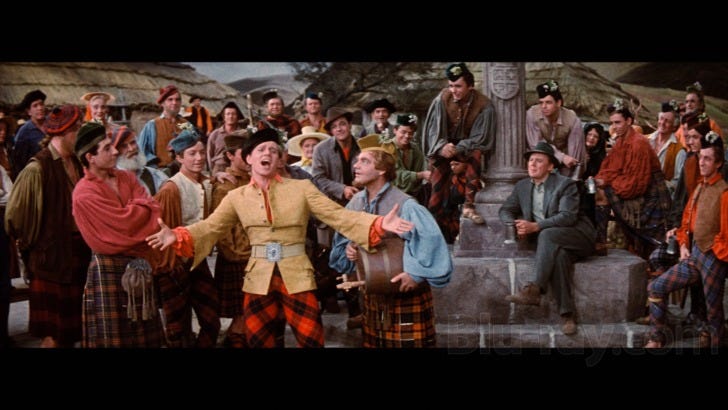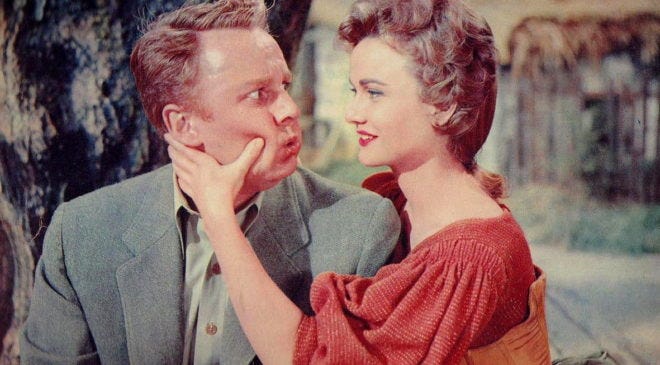My family watched Brigadoon, the 1954 film, last weekend for our family movie night, after incessant requests from my older daughter to finally watch it. Most of this insistence is due to my hyping this movie up for her over the past few weeks and months. I’m happy to say she enjoyed it!
If you’re unfamiliar, Brigadoon is the story of a village in Scotland that only appears one day out of every century. I had apparently explained this improperly to my daughter ahead of time, because she thought it was a curse - actually, they consider it a blessing, granted to them via the sacrifice of their minister Mr. Forsythe.
Brigadoon is a favorite of mine, a nostalgic favorite perhaps but a favorite nonetheless - a film I grew up loving since before I can even remember. It has become a bit of a litmus test film for me, but in a specific way. In the first place, it’s not a film a ton of people have seen. Maybe more have sought it out in the wake of the AppleTV musical series “Schmigadoon,” but I’m not even sure about that. It’s a relatively obscure MGM musical, not nearly of the widespread acclaim or appeal of Singin’ in the Rain or An American in Paris, though it also stars Gene Kelly.
And even among those who HAVE seen it, it’s far from universally acclaimed. Many, even classic film fans, balk at its schmaltzy storyline, matte painted backdrops, blatantly fake Scottish accents, and the relatively simplistic partner dances granted to Gene Kelly and Cyd Charisse, unquestionably two of the most accomplished dancers in Hollywood at the time. I will grant you that the best place to watch Kelly and Charisse dance together is the Broadway Rhythm sequence of Singin’ in the Rain, but that doesn’t mean Brigadoon is without value.
I don’t begrudge Brigadoon-detractors ANY of these points, so it’s not a case of “love this film or I’ll disown you” - a position I might take with any number of other films, such as Night of the Hunter or Band of Outsiders (imagine the nights when I introduced those movies to my then-boyfriend…he’s my husband now, so clearly he reacted properly to them). No, with Brigadoon I fully understand why people might not like it, and I think they are valid reasons.
That said, if you DO love Brigadoon as I do, we are instant and forever friends, even if we disagree on many other vital matters. At least we have Brigadoon. We are a tribe. What is it we love about Brigadoon? Speaking for myself, I actually love a lot of the things that others find detractions - I think the matte paintings here are particularly beautiful. I think the attempts at Scottish accents are adorable. I adore the men dancing in kilts in the square, and the very idea that people would break into song and dance merely because they’re going to market, as they must do EVERY DAY! Can I understand how someone would find the idea that “everyone is searching for their Brigadoon” trite and sentimental? Yes - but I also think it’s true, however baldly this movie happens to put that. Truth sometimes appears as cliche because it is TRUE.
Perhaps for me Brigadoon is a tonic against a cynical age, a reminder that some people, at some times, and at some places, have believed in the magic of faith and love. A reminder that even 20th Century New Yorkers aren’t immune to enchantment, and that possibly even the sardonic Van Johnson character (who I think adds a ton to the film to counterbalance what might otherwise be admittedly saccharine) is capable of realizing our modern world doesn’t necessarily satisfy.
I was trying to think of other films that fulfill the same type of litmus test and couldn’t really come up with any. MAYBE Seven Brides for Seven Brothers? That’s maybe the closest. What fits this principle for you?
Matters to Commonplace
Ancient and medieval people reserved their awe for memory [instead of imagination]. Their greatest geniuses they describe as people of superior memories, they boast unashamedly of their prowess in that faculty, and they regard it as a mark of superior moral character as well as intellect.
- Mary Carruthers, The Book of Memory (a book I’ve been searching for a LONG time, finally have in hand and am savoring slowly)
The young man or woman writing today has forgotten the problems of the human heart in conflict with itself which alone can make good writing because only that is worth writing about, worth the agony and the sweat.
He must learn them again. He must teach himself that the basest of all things is to be afraid; and, teaching himself that, forget it forever, leaving no room in his workshop for anything but the old verities and truths of the heart, the old universal truths lacking which any story is ephemeral and doomed – love and honor and pity and pride and compassion and sacrifice. Until he does so, he labors under a curse. He writes not of love but of lust, of defeats in which nobody loses anything of value, of victories without hope and, worst of all, without pity or compassion. His griefs grieve on no universal bones, leaving no scars. He writes not of the heart but of the glands.
- William Faulkner, 1950 Nobel Prize Speech
Matters to Read
Gone But Far from Forgotten by Kristin Thompson
The great film academic David Bordwell passed away at the end of February, after a long battle with cancer and lung disease. While Bordwell might not have been as popularly well-known as Roger Ebert or other newspaper film critics, he was immensely formative on many of us who read his film textbooks and academic writings. His book Film Art (written with his wife and fellow academic Kristin Thompson) is a staple of intro film classes, and my go-to recommendation for anyone serious about the study of film. He also has a seminal film history book, and many books delving into a variety of topics from formalism to national cinemas to the role of critics in shaping cinema. What sets him apart from other academics is his genuine enthusiasm for cinema, and his uncharacteristic interest in writing thoughtful and scholarly works yet aimed at a general audience. His blog (linked above) hasn’t been very active in the past few years due to his declining health, but it is a treasure trove of excellent articles that kept me plugged into deep thinking about film even after I left academia. His passing represents a true loss to cinema studies.
How I Actually Started Reviewing All the Books I Read - BookRiot
I rarely agree with a BookRiot "practical" post, but this one is pretty spot-on. I’m going to start trying to do this. It’s not really about “reviewing”, it’s about journaling immediately after reading for YOURSELF, not for anyone else.
The Great American Novels - The Atlantic
So…great American novels but arbitrarily starting at 1924, so no Twain, Melville, Hawthorne, or Cooper, eh? Cool, cool. Also, the decade with the highest concentration of Great Novels is…the 2010s! Yep, books that are 4-13 years old, clearly standing that test of time.
A Portable Sanctuary - A Gathering of Curiosities
I really love this idea of notebooks and fountain pens creating a sort of sacred space and time in a world dominated by digital interruptions. I’m trying to write more things in notebooks rather than on screens, and I find myself a lot more grounded and serene when I do. Definitely something worth making time for, though I’m so far pretty bad at that.
Words, Words, Words by Andrew Klavan
When people’s opinions differ — about God, say, or morality, or the qualities of a work of art — it is often because some of those opinions are wrong. The evolution of our eyes did not create light. Our eyes evolved because light was there, and our eyes give light its human appearance. The same is true of our moral and religious senses. They did not create spiritual truth; they were created because spiritual truth is there for us to perceive. If you look upon a candy cane and see a gorilla, you are mistaken. Likewise if you look upon your fellow man and think it would be fine to murder him.
Words matter. Words mean. Differences of opinion does not mean truth does not exist. Such great things. I’m not caught up on The New Jerusalem but this one was too good not to share.
The Virtues of Sheep - Front Porch Republic
As a teacher in a school that strongly promotes leadership, I found this a really interesting reminder that we are also called to be sheep, and there is also virtue in following well. In fact, our culture typically uses “sheep” as a highly derogatory descriptor, and it’s worth thinking about what qualities of sheep we SHOULD emulate, especially in relation to our Good Shepherd.
Planets That Are Entirely a Single Biome, Ranked - Polygon
Cities over forests tells me this was written by a city-dweller, but mainly this has me wondering…everyone wants to do desert or jungle planets, but why are there no pasture/farmland planets, or no prairie planets, or no rolling foothill planets? Those would definitely be top of my list.
Matters to Watch
I’ve really been enjoying this channel - Tristan Reads the Classics. It’s a somewhat rare BookTube channel about classic literature rather than contemporary lit, Tristan is incredibly enthusiastic about everything, and he has a cool accent.
I don’t agree with this guy on everything, but he uses one of my absolute favorite poems to illustrate how to work through a difficult poem, and does a fine job with it. I was kind of hoping he would look at some Eliot, who I find vastly more challenging but just as rewarding as Hopkins, but maybe another time.
Matters to Listen
This has been one of my go-to albums for class the past couple of weeks. Shostakovich or Tchaikovsky for 12th grade (who are reading The Brothers Karamazov) and Schumann or Brahms for 11th grade (who are reading Tess of the d’Urbervilles).








Tristan's Classics channel... my word thank you for sharing that